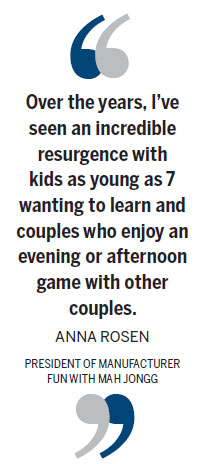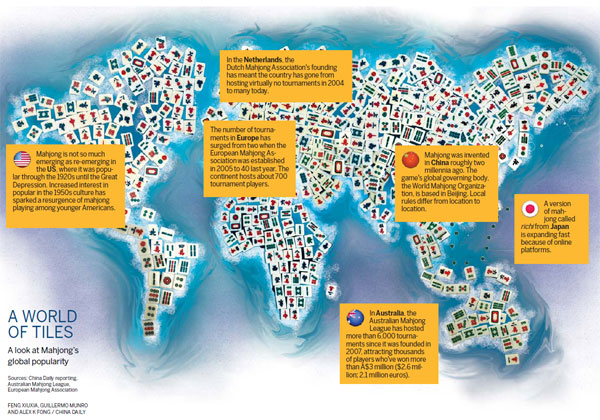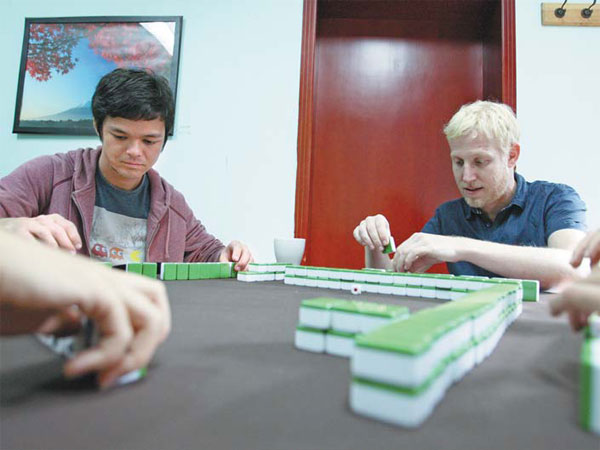Unto the four corners of the Earth
Updated: 2014-11-07 11:43
By Erik Nilsson(China Daily Europe)
|
|||||||||||
Forget the compass, paper, printing and gunpowder - it is with mahjong that China is making its mark
Technology is a driving force in promoting the traditional Chinese game internationally. Foreigners are beating Chinese at their own game, and many Chinese are not particularly happy about it.
Uproar ensued after the highest-scoring Chinese player at this year's European Mahjong Championship came in 30th and the highest-ranking Chinese team finished 37th.
"This result is equal to Brazil not qualifying for the World Cup," media quoted foreign Chinese news site Literature City as saying. (Many pundits pointed out that China did not qualify for the World Cup.)
Emotions became visceral on social media, and traditional media chimed in. Explanations - some said excuses - were debated. They included jetlag, weak players, luck of the draw, or lack thereof. Any and all of these may be true.
But Yao Xiaolei, assistant secretary-general of the game's Beijing-based global governing body, the World Mahjong Organization, points to a certainty fewer dispute. "Although the results were not good, we should look at the very quick development of European (tournament) mahjong in recent years. It showed Chinese mahjong's promotion has been rewarded," media quoted Yao as saying.
The game invented in China roughly two millennia ago is gaining ground globally in the new millennium. It arguably ranks among the country's top cultural exports.
"Mahjong is increasing in popularity in Europe," says Tina Christensen, president of the European Mahjong Championship's organizer, the European Mahjong Association.
"In Europe, mahjong (events are) organized in several countries with many tournaments and many demonstrations at game and culture festivals," says Christensen, who is also the World Mahjong Organization's deputy secretary-general. "There is some luck involved in mahjong. But China didn't send their strongest player to recent tournaments in Europe."
Australian Mahjong League managing director Freddy Fajardo asserts a home-turf disadvantage. "It's a combination of learning the tournament rules, scoring, formats and practice," he says. "Mahjong is a game of skill that does also require a little bit of luck."
More "mahjong cruises" are setting sail from Western ports, and overseas national associations, tournaments and leagues are proliferating.
European tournaments have surged from two when the European Mahjong Association was established in 2005 to 40 last year, Christensen says. The continent hosts about 700 tournament players, she says.
Ann M. Israel, co-author of Mah Jongg: The Art of the Game points to US surveys that suggest the country hosts between 500,000 and 800,000 players of various levels. "Mahjong is popular with literally millions of participants in all the Asian countries."

"Mahjong is now played in the Middle East and throughout Europe. There is no question the game has a growing international following. (Its) global popularity is expanding, with no end to its growth."
Anna Rosen, president of manufacturer Fun With Mah Jongg, points to industry surveys saying player numbers have risen from 90 million worldwide a few years ago to 500 million.
Owner of Dutch Web shop Mahjongshop DOt1 Janco Onnink explains the Dutch Mahjong Association's founding has meant the country has gone from hosting virtually no tournaments in 2004 to many.
"When we started offering our mahjong line, we had eight products," says Onnink, who has competed in international mahjong tournaments. "We now offer over 75 items sold on a retail, wholesale and export basis. There were very few websites when we started. Today, there are thousands."
The Australian Mahjong League has hosted more than 6,000 tournaments since it was founded in 2007, attracting thousands of players who have won more than A$3million ($2.6 million; 2.1 million euros), says the league's managing director Freddy Fajardo.
International trends include more daylong tournaments and weeklong festivals, says Jan Davison, president of Australia's Rockhampton Mahjong Club Inc. Others are younger players and there are more men, although retired women still comprise most of the Western base.
"Over the years, I've seen an incredible resurgence with kids as young as 7 wanting to learn and couples who enjoy an evening or afternoon game with other couples," says Rosen, who also teaches classes.
"Although the game is predominantly played by men in China, in the United States most men consider this a woman's game and don't want to learn. But that trend is also slowly changing."
Israel points to nostalgia for the earlier decades when the game was popular in the US as a reason for its revival among younger Americans.
"Younger people - men and women alike - (are) recalling with great affection the clattering of the tiles at their mothers' or grandmothers' mahjong tables," she says.
Media report the game has become a staple in some US singles bars frequented by youth. Mahjong is not as much emerging as re-emerging in the US, where it was popular through the 1920s until the Great Depression, Rosen says.
It maintained some appeal until the early 1960s, she says. "However, by the late '60s it became stereotyped as a game that only older Jewish women were playing," Rosen says. "But today, with 1950s nostalgia becoming so popular thanks to television shows such as Mad Men, the game is enjoying a renaissance."
Mahjong's international popularity is propelled by an organized effort to promote it, especially via tournaments, Christensen believes.
Technology has been a driving force. "I attribute its popularity to the fact that the world as we know it has become smaller due to technological advances and the expansion of social media," Rosen says.
Onnink says: "(It's now possible) to play online with players from all over the world."
But the explosion of apps has proven a double-edge sword. Most "mahjong" apps are in fact matching games bearing no resemblance to any variant of mahjong apart from the tiles' appearance. Yet many newbies are not wiser.
"However, with the number of people playing this online matching game, more and more people become aware that a real game does exist, and many do seek out the opportunity to learn (it)," Israel says. "Additionally, the (US) National Mah Jongg League, among other sources, offers a virtual mahjong game played online. All of this adds to the visibility of the game and promotes further interest in the actual game."
Davison also sees both sides of the coin when considering the matching-game apps that misleadingly bill themselves as mahjong. "It whets the appetite for the real thing," she says.
"A lot of non-club members play mahjong on their computers."
Christensen says the Japanese richi version is expanding particularly fast because of online platforms. "The availability of many social media and apps has raised the profile of mahjong across the world," Fajardo says.
"This has made people talk about mahjong and seek further information about the history of mahjong, its origins, styles of play and where to play. Our vision is to provide live and online mahjong platforms that reach all adult markets across the world. We believe this growth potential is yet to be fully reached."
Rules' standardization has proven a boon and a bane. Rubrics vary by location in China, and many sets of international standards are clamoring to be recognized as the global standard. Many countries, such as the US and Japan, have developed diverse homegrown variants that are also competing for recognition as the law of the land within their borders and beyond.
It can be said mahjong is less of a game than a family of games. Christensen calls standardization "a must".
Fajardo says: "Our vision is to have a unified approach to the rules and tournament formats around the world that benefit the internationalization of mahjong. Other challenges include legislation in many markets that consider mahjong to be a form of gambling rather than a game of skill that can be enjoyed by men and women of many generations. These types of restrictions restrict the promotion of mahjong and potential internationalization."
Insiders agree globalization will surpass barriers to transcend boundaries. "Mahjong in the United States isn't just for little old Jewish ladies anymore," Rosen says. "It's a game that has grown and will continue to grow as its popularity expands to every corner of the world."
Within the contexts of mahjong's globalization and soft power, the recent Chinese loss in Europe can be viewed as a different take on international game theory - one in which China wins, even if it loses.
erik_nilsson@chinadaily.com.cn

|
Mahjong with its arcane terminology can be daunting for novices. Wang Zhuangfei / China Daily |
(China Daily European Weekly 11/07/2014 page24)
Today's Top News
China, Russia agree on military coop projects
Faster pace set in bid to protect Internet
US, France cite concerns about Iran nuclear talks
China donates $2 million to WHO to combat Ebola
Policy banks to lead Silk Road infrastructure fund
Ukraine's rebel leader sworn in
World Cup-winning captain succeeds coach at Evergrande
Ukraine rebels announce results of 'elections'
Hot Topics
Lunar probe , China growth forecasts, Emission rules get tougher, China seen through 'colored lens', International board,
Editor's Picks

|

|

|

|

|

|






